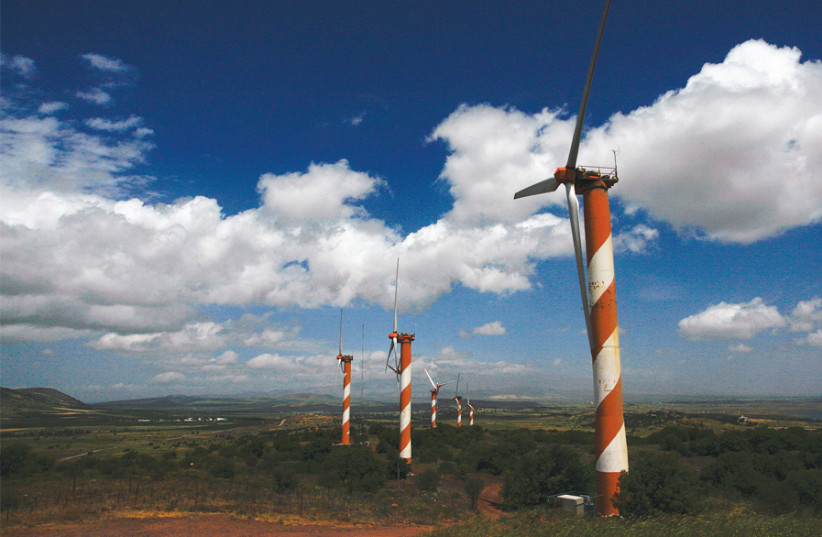Global powers could suffer financially in the move away from fossil fuels - study
Low carbon initiatives affect more than just the climate. Some countries have much to gain, while others face great economic risk.
WIND TU
 |
WIND TURBINES pictured in the Golan Heights. (photo credit: REUTERS) |
For years, the choice to move away from fossil fuels has been a
costly one, causing many countries to delay implementing environmental
policies and leaving others to pick up the tab. A recent study
by the universities of Exeter, Cambridge, the Open University and
Cambridge Econometrics shows that this is no longer the case. There is
much to be gained from a shift toward renewable energy, environmentally
and economically.
The global transition from fossil fuels
to renewable energy is well underway, and it’s now apparent that
getting on board may actually be the most effective approach for
countries to both combat climate change and save money. As
environmentally-friendly policies are implemented in an increasing
number of countries, the choice to continue relying on fossil fuels may
come with more consequences than a changing climate alone. Exactly what
risks or rewards a country faces will depend on its relationship with
fossil fuels.
Countries
can be divided into one of three categories. For those that are heavily
reliant on the import of fossil fuels, such as those in the European
Union and China,
moving toward greener policies has many benefits. Decarbonization for
these countries means an opportunity to redirect financial resources
toward the innovation of new technologies and jobs on a domestic level.
At the same time, oil-rich countries that rely on the export of fossil
fuels, such as Saudi Arabia, can reduce negative impact on their own
economies from decreased global demand for fossil fuels by preemptively
flooding the market at a reduced cost.
Countries like the US, Canada and Russia are regarded as “large
uncompetitive exporters” and stand to lose the most from continued
reliance on fossil fuels. In a market flooded by exports from other
oil-rich countries, these large exporters would be unable to compete.
Stranded oil assets combined with lack of investment in new technology
could lead to industrial decline as certain economic activity and job
sectors dependent on the fossil fuel industry become obsolete.
Redirecting efforts toward the creation of new low-carbon technology
would help to mitigate the negative economic impact.

A man walks past a advertising in relation with the UN Climate Change
Conference (COP 26) where world leaders discuss how to tackle climate
change on a global scale, near the conference area in Glasgow Scotland,
Britain October 30, 2021. (credit: REUTERS/YVES HERMAN)
“As
the economy transforms, if you do not decarbonise, you are shooting
yourself in the foot.”
Professor Jorge Viñuales, of the University of
Cambridge and co-author of the study, said. “The key question is how to
do it in the specific conditions of your country.”
“The
disruptive nature of the low-carbon transition makes untenable a
macroeconomic strategy based on ‘business-as-usual,” said Dr. Pablo
Salas, from the University of Cambridge Institute for Sustainability
Leadership (CISL).
“Supporting low-carbon innovation is the only way to maintain long-term competitiveness in a decarbonizing economy."
This page was posted by Sputnik One of the Sputniks Orbit blog
Please Recommend this page and follow us


No comments:
Post a Comment